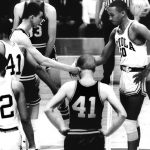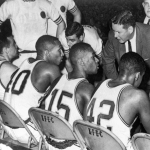Notice: Undefined offset: 1 in /var/www/wp-content/themes/jnews/class/ContentTag.php on line 86
Notice: Undefined offset: 1 in /var/www/wp-content/themes/jnews/class/ContentTag.php on line 86

By Rickey Hampton, Editor and Founder of TheAfricanAmericanAthlete.com

[dropcap]W[/dropcap]hen I hear the current president, who is a racist, talk about “Making America Great Again” I am sure an entire generation of the black community is wondering what in the hell is he talking about?
Black America has literally been enslaved, marginalized, ostracized, discriminated, segregated and murdered over the course of American history.
However, to say every white person thought that way would be a mistake. An example of white men turning against the discrimination policies of the day occurred in 1963. The NCAA basketball regionals featured a game between the Loyola University of Chicago Ramblers and the Mississippi State University Bulldogs, on the campus of Michigan State University.
Now, some of you may be surprised to know Loyola’s run to the 2018 Final Four is not the school’s first time on the national stage for basketball. The 1963 Loyola Ramblers captured the NCAA title. The journey to that title game included a matchup with SEC champion Mississippi State.
The Bulldogs’ basketball team was a powerhouse in the SEC at that time, knocking off Adolph Rupp’s Kentucky teams to win conference titles in 1959, 1961 and 1962. However, each of those years the Bulldogs skipped the NCAA tournament. Why? In Mississippi not only did they not want black people in their schools, they didn’t even want their teams to compete against black athletes.
And it looked like 1963 wouldn’t be any different when you consider Loyola had four blacks in their starting lineup: Les ‘Big Game’ Hunter, Vic Rouse from Pearl High School in Nashville, and New Yorker’s Jerry Harkness and Ron Miller.
Mississippi’s ignorance, racism, and hatred was so intense that they would rather not compete in the NCAA, than take a chance on having to play against a team with blacks.

Playing against black athletes was “not for the best interests of Mississippi State University, the state of Mississippi or either of the races,” explained Ross Barnett, who was Mississippi’s racist Governor at the time.
It is safe to say that some of the people, who voted for the current president, would have been in support of Barnett’s stance…but I digress.
Because this story is about people who decided to do the right thing. Bulldogs’ coach Babe McCarthy had grown tired of the nonsense. He wanted his team to have the opportunity to play against the best, and some hatred and ignorance wasn’t going to stop him.
McCarthy literally had to sneak the team out of Mississippi in the dead of night to make the trip to East Lansing, MI., in order to play Loyola.
The iconic photograph of Loyola’s Harkness and MSU’s Joe Dan Gold shaking hands before the tipoff, symbolizes what was really an historic step in America’s civil rights movement.

Loyola, with its four black starters, would go on to win the game 61-51, and the Ramblers would go on to capture the NCAA title, defeating the Cincinnati Bearcats in overtime. Three years later Texas Western University would defeat Kentucky in the 1966 NCAA title game with five black players in the starting lineup.
Now, when you look back and compare Loyola and Mississippi State, let’s examined what happened. Loyola was willing to open its doors to people of color, and Loyola coach George Ireland wasn’t afraid to put the best players on the floor, which happened to be four blacks. They were rewarded with a National title. Of course, even if they had lost the game to Cincinnati, the Loyola Ramblers did the right thing and that is to be applauded.
Meanwhile, because of Mississippi’s hatred and tradition of discrimination, and its willingness to close its doors to people of color, it forever haunts them. Although it was shameful that the 1963 team had to ‘escape’ the clutches of racism to go play a simple basketball game, they at least got the chance to see how great they could have been.
The outstanding teams that came before them at MSU will never know how great they could have been. They did not realize when they denied black athletes the chance to compete, they were denying themselves.
It’s certainly a lesson America should consider today as some segments want to return America to the times the Mississippi State basketball team lived in. There is nothing great about that. In fact, what took place in the America of yesteryear was tragic. Linked are two videos about the Loyola-Mississippi State game and the 1963 National champion Loyola Ramblers.


